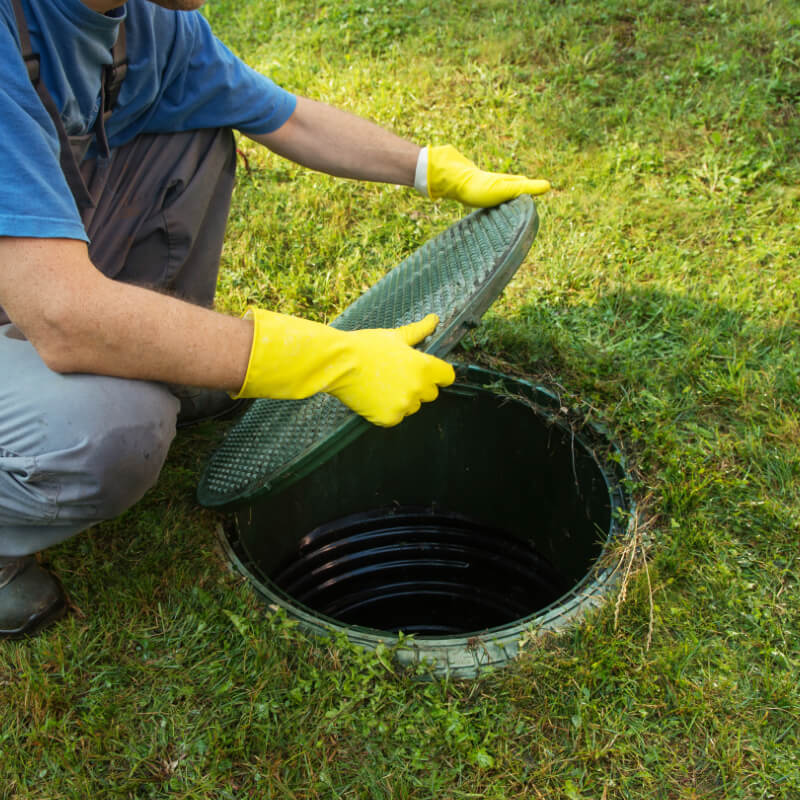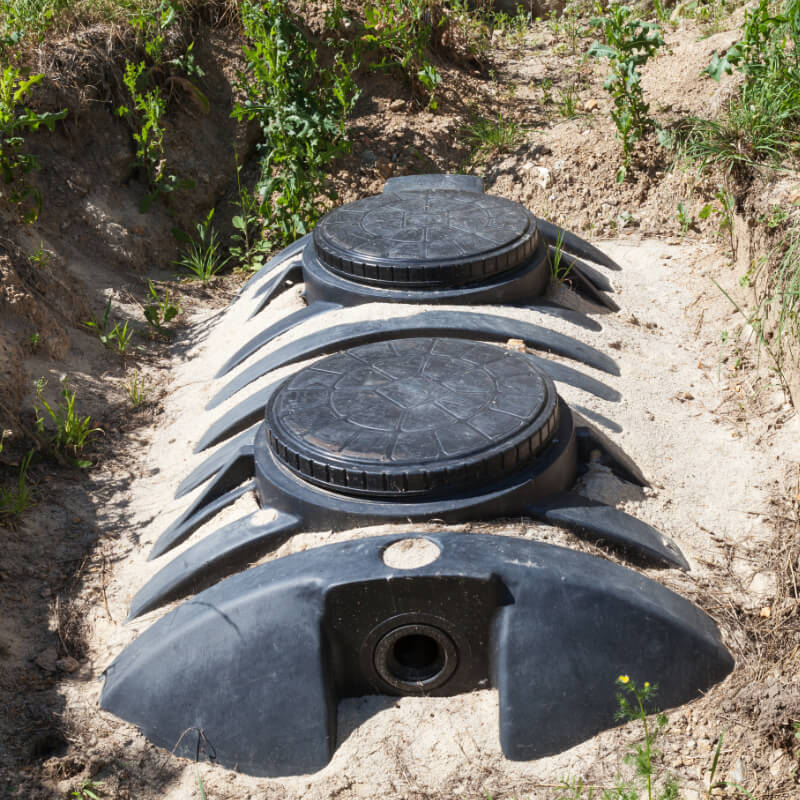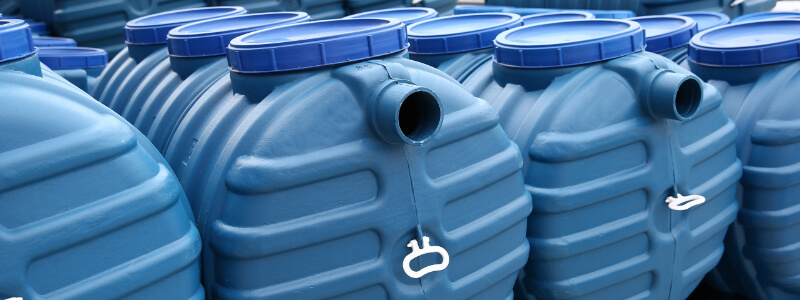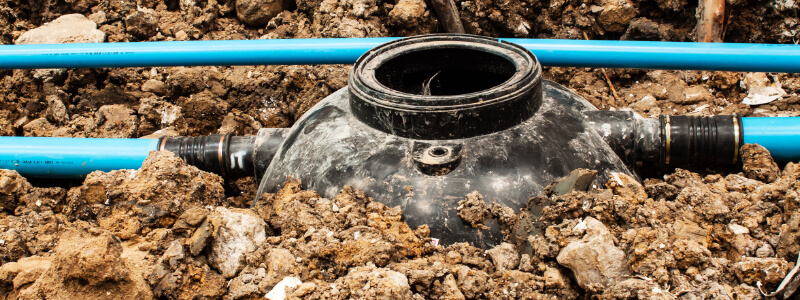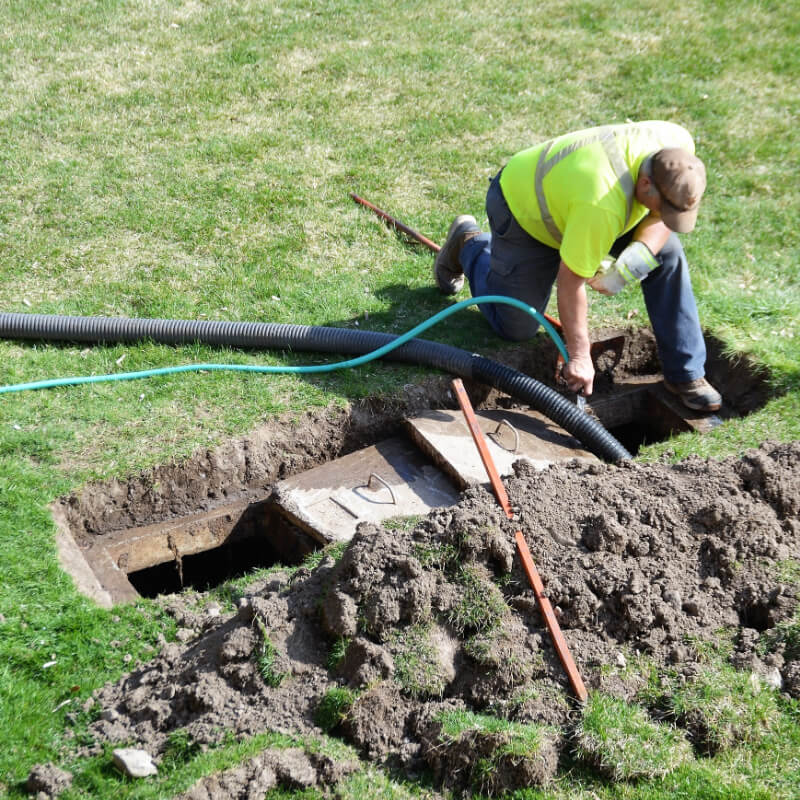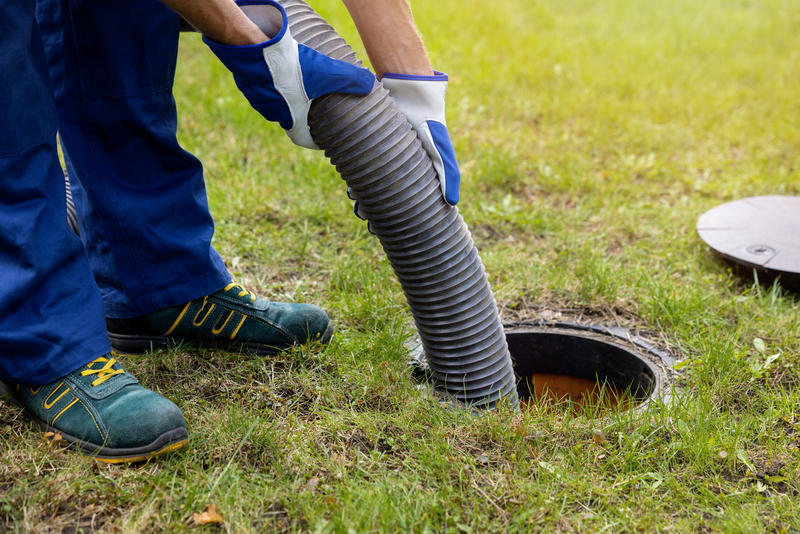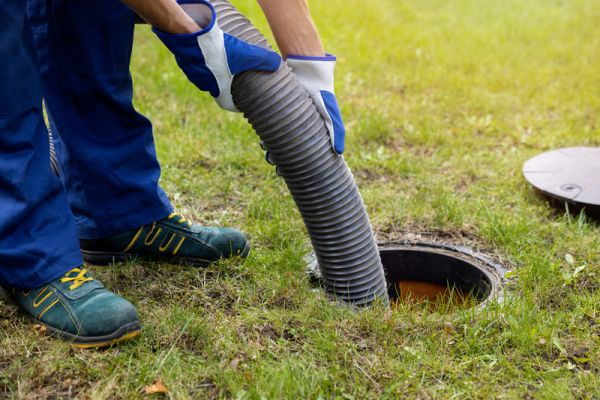In this article
What is the maintenance process of septic tanks?
So, you've got your sewage treatment plant installed - a shiny new septic tank to make any neighbour jealous. But how do you make sure you're taking good care of your septic system? These underground wastewater treatment systems play a vital role in managing your household sewage efficiently and if you want to make sure you maintain a reliable septic tank - there are certain practices and up-keeps you must follow.
Maintaining a septic tank is not just a task—it's a crucial responsibility that ensures the efficient treatment of household wastewater while safeguarding your property and the environment. In this blog, we will dive deep into the maintenance process of septic tanks, unraveling the steps, best practices, and expert tips essential for preserving the functionality and longevity of these vital systems.
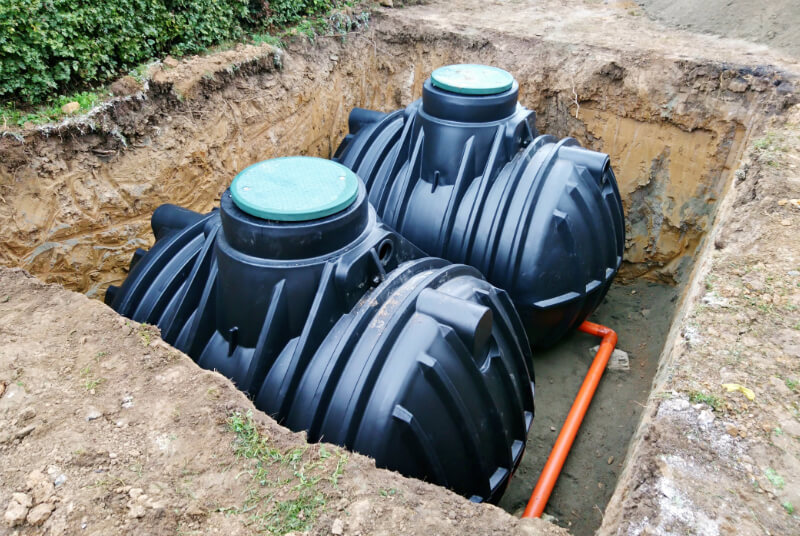
What is a Septic Tank and How Does It Function?
Before we can look at how to best take care of these sewage treatment plants, it's pivotal to understand how a septic tank works and how these domestic sewage tanks coincide with your homes drainage field.
A septic tank is a key component of an onsite sewage treatment system commonly found in homes not connected to municipal sewer lines. It serves as a primary treatment facility for household wastewater, separating solids from liquids and allowing the effluent to undergo further treatment in the drain field via an outlet and inlet pipe system.
How a septic tank functions
-
Wastewater Collection: Household wastewater from sinks, toilets, showers, and laundry drains into the septic tank.
-
Separation Process: Inside the tank, solid waste settles to the bottom as sludge, while lighter materials like grease and oils float to the top as scum.
-
Biological Breakdown: Bacteria and enzymes naturally present in the tank help break down organic matter, converting it into liquid effluent.
-
Effluent Discharge: The clarified liquid effluent exits the septic tank and flows into the drain field for further filtration and absorption into the soil.
Role of Septic Tanks in Wastewater Treatment
Septic tanks play a crucial role in treating and disposing of household wastewater efficiently and sustainably. Their functions include:
-
Primary Treatment: The septic tank acts as the initial treatment stage, separating solids from liquids to prevent clogging and contamination.
-
Nutrient Removal: Through natural biological processes, septic tanks remove harmful pathogens and nutrients from wastewater before it enters the environment.
-
Groundwater Protection: Properly functioning septic tanks protect groundwater quality by treating sewage onsite and minimising the risk of contamination.
Components of a Typical Septic System
A standard septic system consists of several key components working together to treat and dispose of household wastewater effectively:
-
Septic Tank: The primary treatment unit that collects, separates, and partially treats wastewater.
-
Distribution Box: Distributes effluent evenly to the drain field pipes.
-
Drain Field: A network of perforated pipes buried in soil to further treat and disperse effluent.
-
Soil Absorption Area: Soil beneath the drain field where effluent is absorbed and treated by natural processes.
Understanding the fundamental components and functions of a septic system is essential to grasp the importance of proper maintenance and care to ensure the system operates efficiently and protects both property and the environment.
Importance of Regular Maintenance for Septic Tanks
Now that we understand a bit more about how a septic tank system works and how important they are to a homes drainage system, we can see why its so important to keep-up with its care and maintenance. Let's highlight some of the main reasons why it's so important to look after your septic tank.
-
Preventative Care: Proactive maintenance helps identify potential issues early, allowing for timely repairs and avoiding major breakdowns.
-
Extended Lifespan: Proper upkeep extends the lifespan of the septic system, reducing the need for premature replacements.
-
Cost Savings: By addressing minor problems promptly, homeowners can avoid costly repairs and extensive damage to the system.
-
Early Issue Detection: Regular inspections and maintenance checks help detect small leaks, blockages, or malfunctions before they escalate into larger, more expensive problems.
-
Efficient Operation: Well-maintained septic systems operate more efficiently, reducing the risk of backups, overflows, and contamination of soil and groundwater.
-
Environmental Protection: Properly maintained septic tanks treat wastewater effectively, minimising the release of harmful pollutants into the environment.
Risks of Neglecting Septic Tank Upkeep
While it's important to know why it's so important to look after your septic tank, it's important to understand the risks of neglecting a septic tank and what consequences this can lead to.
-
System Failure: Lack of maintenance can result in system failure, leading to backups, odours, and potential health hazards for residents.
-
Property Damage: Untreated issues like leaks or blockages can cause damage to the septic system components, requiring costly repairs or replacements.
-
Environmental Impact: Neglected septic tanks pose a risk of contaminating groundwater, surface water, and soil, impacting ecosystems and public health.
So, what is the maintenance process of a septic tank?
Ensuring the efficiency and longevity of septic tanks hinges on the diligent execution of essential maintenance tasks. Maintaining the optimal functionality and durability of septic tanks requires a structured approach encompassing key maintenance tasks. Let's delve further into the essential maintenance process that homeowners should adhere to:
1. Pumping: Regular emptying is a cornerstone of septic tank maintenance, aimed at preventing system overload and ensuring uninterrupted wastewater treatment. It's advisable to schedule periodic pumping every 3 to 5 years to remove accumulated solids, safeguard against clogs, and maintain the tank's efficiency.
2. Inspections: Annual inspections serve as crucial checkpoints in the maintenance regimen, allowing you to proactively identify potential issues before they escalate. During inspections, look out for signs of leaks, damage, or any anomalies that may require immediate attention to prevent system malfunctions.
3. Cleaning: Professional cleaning services play a pivotal role in preserving the optimal performance of septic tanks by addressing excess scum and sludge buildup that can hinder efficient operation. Consider engaging experts to conduct thorough cleaning sessions, promoting the longevity and effectiveness of your septic system.
4. Monitoring and Record-Keeping: Beyond the core maintenance tasks, it's beneficial to maintain a meticulous record of maintenance activities, including pumping dates, inspection findings, and cleaning schedules. Monitoring these aspects not only ensures timely upkeep but also provides valuable insights into the overall health of your septic tank over time.
Recommended Maintenance Schedule Tailored to Your Needs
When it comes to septic tank maintenance, a personalised approach based on specific factors is key to ensuring the continued efficiency of your system.
Factors Influencing Maintenance Needs
Various factors, including tank size, material, and usage patterns, can influence the maintenance requirements of septic tanks:
-
Tank Size: Smaller tanks may require more frequent pumping to prevent overloading and backups.
-
Material: The material of the tank, such as concrete or plastic, can impact its durability and susceptibility to damage over time.
-
Usage Patterns: Heavy water usage, use of garbage disposals, or introduction of non-biodegradable items can accelerate the accumulation of solids in the tank.
Let's take a deeper dive into how household size, water usage, and system capacity influence the recommended maintenance schedule:
Household Size:
-
Smaller households typically generate less wastewater, leading to slower tank filling. As a result, they may require less frequent pumping—often every 3 to 5 years—to maintain optimal functionality.
-
Larger families with increased water usage should consider more regular pumping intervals, potentially every 2 to 3 years, to prevent overloading the system and ensure smooth operation.
Water Usage:
-
High water consumption habits, such as frequent laundry, extended showers, or the use of water-intensive appliances, can expedite the accumulation of solids in the tank.
-
Homes with heightened water usage patterns should prioritize more frequent inspections and cleaning services, possibly every 1 to 2 years, to address potential issues proactively and avoid disruptions in wastewater treatment.
System Capacity:
-
The size of your septic tank directly impacts its storage capacity and the rate at which it fills up with wastewater and solids.
-
Tanks with smaller capacities may necessitate more frequent pumping and maintenance, such as every 2 to 4 years, to prevent backups and maintain optimal functionality.
By aligning your maintenance schedule with these guiding factors, you can proactively care for your septic tank, mitigate potential issues, and uphold the efficiency and longevity of your wastewater treatment system.
What Septic Tank Problems Can typically arise?
Septic tank systems, while efficient when properly maintained, can encounter a range of challenges that necessitate timely intervention to ensure ongoing functionality. Here are common problems that may arise with septic tanks:
1. Septic Drain Field Issues:
A failing drain field can lead to slow drainage, soggy ground above the drain field, or sewage backups in the house. This often indicates a clog, saturation, or system overload that requires professional assessment and potential repairs.
2. Tank Overflows:
If a septic tank overflows, it can result in foul odours, wet areas around the tank, or sewage backup in sinks and toilets. This issue calls for immediate attention to prevent environmental contamination and health hazards.
3. Blockages and Clogs:
Blockages in pipes, inlet/outlet ports, or the tank itself can disrupt the flow of wastewater, causing backups and inefficiencies in the system. Addressing blockages promptly through professional cleaning or repairs is crucial to restore proper functioning.
4. Leaks and Cracks:
Leaks or cracks in the tank walls or components can lead to groundwater contamination, structural integrity issues, and system failure. Identifying and repairing leaks early on is vital to prevent further damage and ensure the longevity of the septic system.
5. Tree Root Intrusion:
Tree roots seeking moisture and nutrients can infiltrate septic system components, causing blockages, damage, and system malfunctions. Root removal techniques and protective measures can help mitigate this issue and preserve system integrity.
6. Pump Failure:
Pump failures can impede the proper removal of wastewater from the tank, leading to backups and potential overflow. Regular maintenance and prompt pump repairs or replacements are essential to avoid disruptions in system operation.
By understanding these potential septic tank problems and being proactive in addressing them with professional assistance and regular maintenance, homeowners can mitigate risks, prolong the lifespan of their septic systems, and maintain a clean and healthy environment for their property and community.
Knowing When to Seek Professional Help
While regular maintenance tasks can be managed by homeowners, there are certain situations where professional intervention becomes imperative for the optimal functioning and longevity of septic tanks. Here's when it's advisable to enlist the expertise of professionals:
Pumping:
Professional pumping services every 3 to 5 years are vital for efficiently removing accumulated solids that may be beyond the scope of routine maintenance. Trained professionals have the equipment and expertise to conduct thorough pumping, ensuring the effective operation of your septic system.
Repairs:
Complex repairs, such as fixing leaks, replacing damaged components, or addressing intricate drainage issues, are best left in the hands of experienced professionals. Attempting DIY repairs on critical aspects of the septic system can lead to further damage and compromise its performance.
Inspections:
Periodic inspections carried out by certified technicians offer a comprehensive assessment of your septic tank's condition and help in the early detection of potential problems. Professionals possess the knowledge and tools to identify issues that may go unnoticed during routine inspections, enabling timely intervention and preventive measures.
System Malfunctions:
In cases of system malfunctions, backups, foul odours, or sudden changes in wastewater treatment efficiency, it's crucial to seek immediate assistance from septic tank professionals. These signs may indicate underlying issues that require expert diagnosis and resolution to prevent serious repercussions on your property and the environment.
Importance of Early Detection and Resolution
Early detection and prompt resolution of septic tank issues are crucial for several reasons:
-
Preventing Further Damage: Addressing minor issues early can prevent them from escalating into major, costly repairs.
-
Protecting Health and Environment: Timely resolution of problems minimises the risk of contamination, health hazards, and environmental impact.
-
Maintaining System Efficiency: Proactive troubleshooting and maintenance ensure the continued efficiency and functionality of the septic system.
When to Seek Professional Assistance
While homeowners can troubleshoot minor septic tank issues, it's essential to know when to involve professionals:
-
Persistent Problems: If issues persist after attempting DIY solutions, contact a septic system professional for thorough assessment.
-
Complex Repairs: For leaks, major blockages, or system failures, seek professional expertise to prevent further damage.
-
Regular Inspections: Schedule periodic inspections by certified technicians to detect and resolve potential problems before they worsen.
Regulations and Guidelines for Septic Tank Maintenance
To ensure environmental compliance and system efficiency, you need to adhere to regulations and guidelines governing septic tank maintenance. Adherence to regulations and guidelines is paramount to uphold environmental compliance and ensure the efficient operation of the system.
General Binding Rules
The General Binding Rules for septic tanks in the United Kingdom outline essential requirements that must be followed to ensure proper wastewater disposal and environmental protection. These rules apply to small sewage discharge systems, including septic tanks and treatment plants, and are designed to prevent pollution and promote the sustainable management of wastewater. Here are the key aspects covered by the General Binding Rules:
-
Discharge Standards: The rules specify the quality standards that discharged wastewater must meet to minimise environmental impact and protect water sources.
-
Maintenance Requirements: Property owners are obligated to maintain their septic tanks in good working order, including regular emptying and upkeep to prevent issues that could lead to pollution.
-
Prohibited Discharges: Certain substances, such as oil, chemicals, and non-biodegradable materials, are prohibited from being disposed of through septic tanks to prevent contamination of soil and water sources.
-
Location Restrictions: The rules may include guidelines on the location of septic tanks to ensure they are sited appropriately to minimise risks to groundwater and surface water quality.
-
Compliance and Enforcement: Compliance with the General Binding Rules is mandatory, and enforcement measures may be taken if property owners fail to adhere to the stipulated requirements.
You can out more information in our General Binding Rules page.
Conclusion
Adhering to regulations, implementing eco-friendly practices, and prioritising responsible waste disposal are essential for ensuring compliance and minimising the environmental impact of these shallow dig tanks. Investing in septic tank maintenance not only benefits homeowners but also contributes to a cleaner, greener future for all.
If you'd like to learn more about our shallow dig septic tanks and how they work - or if you have any questions on your drainage pipe system, please do not hesitate to contact us. Our team of experts are here to help install and clean your shallow dig septic tank, fix your blocked drains and help with any drainage and un-treated wastewater issues you may be facing in your home.
Get in touch
Contact our friendly and professional team via form, phone or email for any drainage issues you may have.
From blocked drains to septic tank repairs and replacements, we're here to help. We have over 25 years of experience and offer 24/7 emergency callouts.
-
01386 882324
-
WhatsApp
-
This email address is being protected from spambots. You need JavaScript enabled to view it. -
See what our customers think
